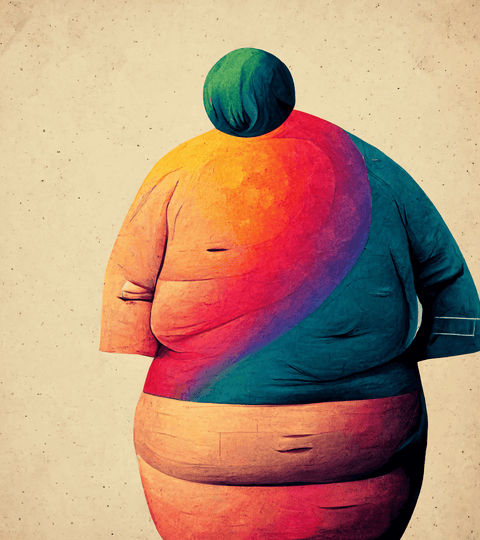Once And For All–Does Cannabis Lead To Weight Gain?
Research suggests that cannabis consumption is associated with lower BMIs, especially when individuals avoid stereotypical dietary practices connected with cannabis culture.
Introduction
If you have even the slightest familiarity with traditional cannabis culture, then you’re well acquainted with “the munchies.”
You know, that sensation when you’re high and all you want to do is eat everything in sight.
I think we can all agree that, high or not, devouring an entire bag of chips or an entire bag of cookies isn’t exactly the definition of healthy eating.
Obviously, not every cannabis enthusiast gives into the munchies. And of those who do, not all of them gorge themselves on the worst possible food.
But some of us who enjoy cannabis do love our chips. And our cookies. And all sorts of other food we probably should’ve left behind on those summer vacations from years gone by.
Yet there’s a funny thing about those of us who partake in cannabis: We come in a wide variety of body sizes.
Still, with the potent appetite-promoting effects of the main psychoactive cannabinoid—Delta-9 THC—it begs the question: Does cannabis lead to weight gain?
We’ll break down the bleeding-edge research on the topic. Read on to learn whether cannabis makes you gain or lose weight.
Why Cannabis Might Lead To Weight Gain
Some may not want to admit this, but there are a few valid reasons why cannabis might lead to weight gain for some people.
First and foremost, cannabis is not a magic bullet that will make you shed lots of pounds without any effort on your part.
Delta-9-THC can be useful as an appetite stimulant for people who have difficulty eating, like cancer patients or those with eating disorders.
That means there’s a good chance that after you spark that joint or hit that vape or swallow those edibles, a ravenous appetite may soon follow.
If you eat massive quantities of calorie-rich food (when high and/or otherwise) and don’t exercise, yeah, you’re probably going to gain some weight no matter how many weed sessions you squeeze into your day.
Another point worth noting is that some people combine cannabis use with irregular eating habits.
For example, if you work from 9-5, shower, eat dinner, tuck away the kids, and come 9:30 you get blazed, eat all the snacks, then pass out, don’t be surprised if your body mass index keeps creeping up.
Fortunately, there’s a lot more good news than bad news about cannabis’ connection to your body mass index.
Why Cannabis Might Lead To Weight Loss
Even though cannabis has long been associated with junk food (and massive quantities of such), you may be surprised to know that cannabis users have lower body mass indexes (BMIs) than the general population.
In fact, we can go one step further: The latest research shows that cannabis does not lead to weight gain.
That fact busts an easy rhetorical trick that naysayers might think to use: Suggesting that cannabis users must start, on average, at lower body weights than those who do not use cannabis.
Simply put, the facts do not support that premise. But why is that the case?
Although the average cannabis user does consume more calories than the average non-user, it is believed that cannabis boosts a person’s metabolism, allowing them to be able to eat more than expected without gaining weight.
Now if you’re one of those cannabis users who has gained weight since you’ve started your relationship with Miss Mary Jane, there could be an interesting workaround for weight loss: high-CBD cannabis.
The reason why that may be so is because cannabidiol acts as a counterbalance to Delta-9-THC’s hunger-stimulating effects, helping limit how far your appetite might go during your next sesh.
Interestingly, though, the very premise that Delta-9-THC leads to weight gain because of the associated increase in appetite might have already been busted.
Researchers have studied the effects of Delta-9-THC on rodents. What they found was that mice given Delta-9-THC lost weight.
Granted, you’re not a mouse.
But we do share approximately 97.5% of our working DNA with mice, so it’s a reasonable jump to speculate that people may receive similar effects from Delta-9-THC and start losing weight.
Cannabis and Weight Loss For People With Common Health Challenges
It appears that cannabis can have a significant effect in promoting weight loss for people who struggle with certain conditions.
You may be aware that cannabis can be an effective treatment for pain relief (even moreso than opioids, according to a University of California - Berkeley study).
But did you know that cannabis can also stimulate weight loss for people with severe pain or muscle stiffness?
The reason why is because the increased mobility brought forth by cannabis’ medicinal properties allows a person to be more active. And that activity burns more calories. Hence, the weight loss.
Now what if you are a person who struggles with alcoholism, binge drinking, or who may just down a number of beers or a couple cocktails two or three nights a week?
The thing is, all that alcohol comes with a lot of calories. (Not to mention, depending on your consumption habits, potential risk of severe health problems).
Reducing or even eliminating your alcohol intake can be made easier for some people through cannabis. And with that, it’s likely that you’ll start losing a little weight from that substitution alone.
Another major concern that affects all of us from time to time—and some of us a whole lot more than that—is stress.
A common way that many people cope with the high levels of stress in their lives is to overeat or eat “comfort” food that may be calorie-rich and unhealthy. If those become consistent patterns, they can lead to weight gain.
Hold on, what? But cannabis gives you the munchies. If I’m struggling with stress and take some cannabis, won’t I eat even more?
Truthfully, you might.
But for some people, the stress-relieving properties of cannabis are more than sufficient to deal with the day-to-day annoyances that may otherwise lead to, let’s just say, a less-than-ideal diet.
What about those sleepless nights? After all, insomnia is linked to weight gain.
There’s some good news here, too: Cannabis has the potential to alleviate—or even eliminate—insomnia. That means no opportunities for middle-of-the-night eating.
Since being up all night when you don’t want to is associated with an excess of cortisol, which is connected to weight gain, this seems to be another advantage for cannabis use.
Conclusion
We’re not saying that cannabis is the end-all, be-all way to lose weight.
Expect to gain weight, not lose it, if you devour twenty dollars worth of fast food every night after you take a few edibles.
And we’re also not saying that if you want to lose weight, or your doctor recommended or even strongly urged you to lose weight, that cannabis can help you lose a lot of weight in a short time.
What we are saying is that for a majority of people who use cannabis regularly and don’t fully succumb to the munchies, there seems to be a slight trend towards weight loss instead of weight gain.
Of course, the best way to lose weight is still through the tried-and-true methods of diet and exercise. However, a few puffs thrown in the mix probably wouldn’t hurt in that respect, too.
Just lay off the extra cheese pizza, and chips, and cookies, and tacos, and all the food in the fridge once those appetite-promoting effects of Delta-9-THC start to emerge and you’ll be golden.

